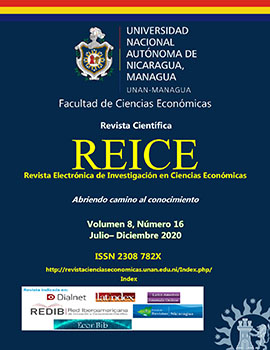Programs developed by UNAN - FAREM Chontales in compliance with the Sustainable Development Goals.
DOI:
https://doi.org/10.5377/reice.v8i16.10662Keywords:
National Human Development Plan, 2030 Agenda Sustainable Development Goals, programs.Abstract
According to the National Human Development Plan (PNDH 2018-2021), Sustainable Development Goals (ODS) and Agenda 2030, the Universidad Nacional Autónoma de Nicaragua (UNAN-MANAGUA) at its regional headquarters, Facultad Regional Multidisciplinaria de Chontales (FAREM Chontales) , has selected as a work area the Sustainable Development Goal 2 Zero Hunger (SDG 2) which proposes “Put an end to hunger, achieve food security and improved nutrition and promote sustainable agriculture” (United Nations Publication 2018: 7) where the work of the Faculty in performance with the SDG is addressed within the framework of Public Policies of Nicaragua.Within this framework, two programs that the Faculty is developing are analyzed: the Observatory Program for Quality of Life and Development of Health Education (OCAVIDEPS) and University in the Country (UNICAM).The Observatory for Quality of Life and Health Education Development Program (OCAVIDEPS) is a strategy developed by FAREM Chontales with the support of Excellency Dos Hermanas City Council in Seville, Spain, in order to face psychosocial risks and poverty, to meet the needs of the population, mainly children, adolescents and young people, since it is a very vulnerable sector and therefore responds to environmental risk factors. Likewise, the Faculty participates in the project "Universidad del Campo" (UNICAM), which was implemented by UNAN-Managua within the framework of the UE ALFA program. It is a project aimed at the inhabitants of rural areas of the country.
Downloads
926
References
CEPAL. (s.f.). Ejes del Programa Nacional de Desarrollo Humano 2018-2021 de Nicaragua. Obtenido de CEPAL: https://observatorioplanificacion.cepal.org/es/planes/ejes-del-programa-nacional-de-desarrollo-humano-2018-2021-de-nicaragua?sdg_id_target_id=36&select-options-ods=36#views-exposed-form-dimensiones-plan-block-1
G. Arias, F. (2012). El proyecto de investigación. Introducción a la metodología científica (Sexta ed.). Caracas, República Bolivariana de Venezuela: Episteme.
GRUN, G. d. (17 de Mayo de 2019). Informe nacional presentado con arreglo al párrafo 5 del anexo de la resolución 16/21 del Consejo de Derechos Humanos. Obtenido de Consejo de Derechcos Humanos: https://www.upr-info.org/sites/default/files/document/nicaragua/sesion_33_-_mayo_2019/a_hrc_wg.6_33_nic_1_s.pdf
Laguna, J. C., Dávila, K. P., & Caldera, E. d. (enero de 2016). Aplicación del Modelo Escuela Nueva en el Programa Universidad en el Campo de la UNAN - MANAGUA, 2015. Torreón Universitario(11), 68-77. Obtenido de https://revistatorreonuniversitario.unan.edu.ni/index.php/torreon/article/view/149
UNAN - MANAGUA. (15 de Octubre de 2018). ANÁLISIS DE MATRIZ DE DESARROLLO DE LAS FUNCIONES DE LA UNAN - MANAGUA EN CORRESPONDENCIA AL PLAN NACIONAL DE DESARROLLO HUMANO (PNDH), OBJETIVOS DE DESARROLLO SOSTENIBLE (ODS) Y AGENDA 2030, 2. Managua, Nicaragua. Recuperado el 14 de Septiembre de 2020
Downloads
Published
How to Cite
Issue
Section
License
Copyright (c) Revista Electronica de Investigacion en Ciencias Economicas
The rights to the articles published in REICE are from the journal, in order to be able to manage their best dissemination. However, since the purpose of the same is the dissemination of knowledge, this journal provides immediate free access to its content, under the principle that making research available to the public free of charge, which fosters a greater exchange of global knowledge.
The opinions expressed by the authors do not necessarily reflect the position of the publisher of the publication or of the UNAN-Managua. Its reproduction and distribution is authorized (in any type of support) provided that the following indications are fulfilled:
- The authorship of the work
- Indicate its origin (REICE magazine, volume, number and electronic address of the document)

